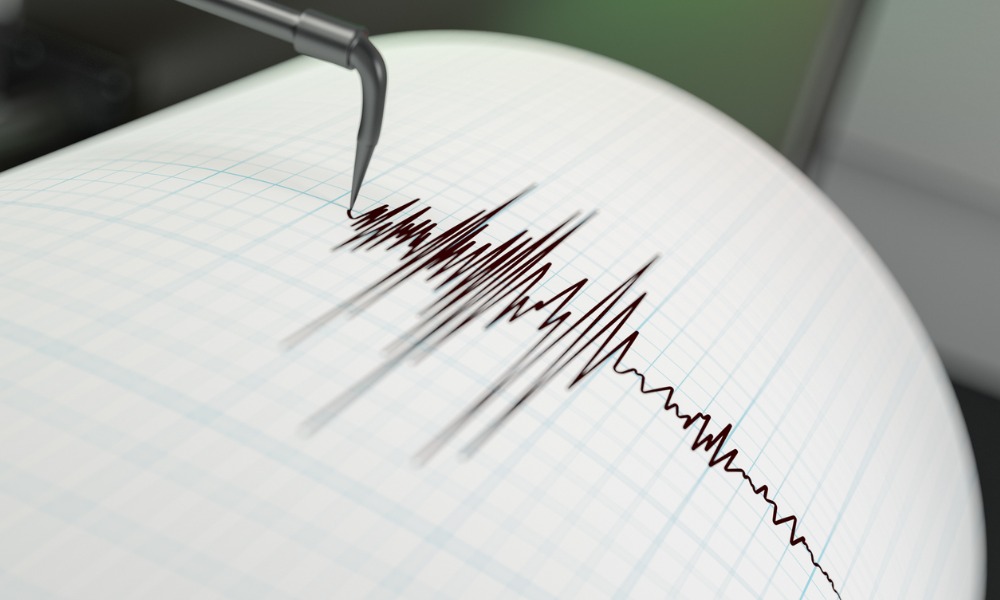Does Quebec have an earthquake insurance problem?

Does Quebec have an earthquake insurance problem? | Insurance Business Canada
Catastrophe & Flood
Does Quebec have an earthquake insurance problem?
Does Quebec have an earthquake insurance problem?
Catastrophe & Flood
By
Nicole Panteloucos
More than half of Canadians live in earthquake-prone areas, with hotspots like Quebec, western Alberta and B.C. taking some of the biggest hits. Just last week, over 200 earthquakes were reported off B.C.’s coast, a reminder of how tectonically active the region can be.
While most of these quakes are minor and go unnoticed, according to the National Risk Profile, the threat to people and property is on the rise due to higher populations and denser cities popping up in these earthquake zones.
Yet there is a stark contrast in the level of coverage take-up – while approximately 65% of homeowners in B.C. carry earthquake insurance, in contrast, only around 4% of residences in Quebec are insured despite the province’s seismic risks.
A trend of underinsurance
Nathan Tjandrawinata (pictured above), managing director at Beacon, pointed out that inadequate coverage could stem from a lack of education. He remarked: “The industry could certainly do better on educating the public. As brokers and underwriters, we are technical experts and not always adept at communicating, but it’s important to have this information out in a way that is easy for people to understand.”
A survey by LowestRates.ca of Canadian homeowners underscores a widespread misconception: 30% of respondents didn’t realize they needed to purchase separate flood and earthquake insurance. Furthermore, according to the Insurance Bureau of Canada (IBC), 33% of Quebecers wrongly believe their basic home insurance policy covers them against earthquake risk.
This exposes a significant underinsurance problem in the earthquake sector, where such coverage is usually an optional add-on to standard homeowners’ policies.
How can brokers better educate clients?
While some may underestimate the costs of earthquake damage, the IBC estimates that a magnitude seven quake in eastern Quebec could lead to losses of nearly $61 billion, of which only $12 billion would be insured. “The exposure for Canadians is there, so it’s clear the industry needs to educate and plan a bit better,” added Tjandrawinata.
Brokers can employ several strategies to educate clients and combat earthquake underinsurance:
Comparison with other insurance policies: Highlight how earthquake insurance differs from standard property insurance and why it’s essential for regions prone to seismic activity.
Clear communication of policy terms: Explain the details of earthquake insurance policies clearly, including coverage limits, deductibles, and exclusions. Ensure clients understand what they are purchasing.
Promote risk mitigation strategies: Advise clients on measures to mitigate earthquake risks, such as retrofitting buildings, securing heavy items, and having an emergency plan. Lowering risk can make it easier and more cost-effective to obtain adequate coverage.
Regular reviews and updates: Conduct regular policy reviews with clients to ensure their coverage remains adequate as property values and risk factors change. This helps to prevent underinsurance over time.
Case studies and examples: Share real-life examples or case studies of past earthquakes and their financial impact on individuals or businesses without proper insurance coverage. This can make the risk more tangible and relevant.
Earthquake cover: a finite resource
While it’s clear that more people in earthquake-prone areas of Canada should ensure they are covered, the cost of coverage in high exposure areas often prices people out of protection.
Unsurprisingly, the location of a home significantly influences premium costs. Insuring a $300,000 home in Toronto can cost as little as $15 annually, whereas earthquake policies in high-risk areas like Vancouver can exceed $300 per year.
Speaking on the significant cost of earthquake cover, Tjandrawinata shared: “If you buy condo or home insurance without earthquake risk, it’s usually about half the price. Often, a client will remove earthquake coverage simply because it makes up the majority of the premium.”
Even if more people adopt earthquake insurance, the challenge remains that the high-risk nature of the product makes it a finite resource. Tjandrawinata noted that this has been exacerbated by some insurers exiting the market in the struggle to keep up with evolving risks in tectonically active areas.
As urban infrastructure expands and cities become more densely populated (Quebec plans to invest over $150 billion in infrastructure over the next six years with record population growth being reported), potential loss values in earthquake prone areas will continue to climb.
“Given the limited supply of earthquake insurance, insurers face tough decisions about how to allocate their capacity. They cannot provide coverage to everyone, so there is definitely an imbalance in the market,” shared Tjandrawinata.
Related Stories
Keep up with the latest news and events
Join our mailing list, it’s free!






